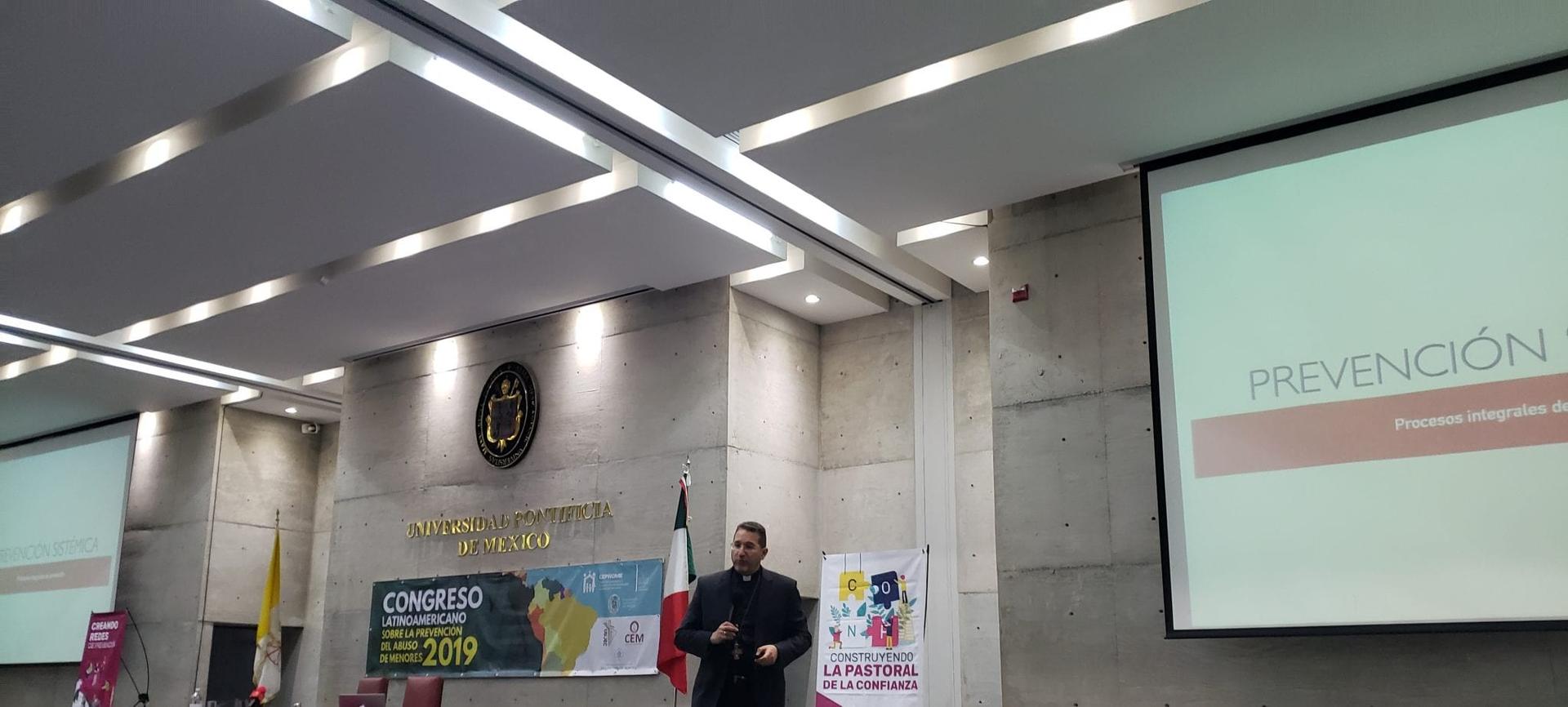MEXICO CITY — A Colombian bishop flatly told a Latin American summit on clerical sexual abuse Thursday that while gringos to the north have taken important steps to combat the problem, his own region basically has done “nothing.”
“We’re in 2019, and in some places and spaces of our Church, nothing is happening” when it comes to the protection of children from clerical abuse, said Bishop Luis Manuel Alí Herrera, an auxiliary of the Archdiocese of Bogota and a member of the Pontifical Commission for the Protection of Minors.
Alí was speaking at a Nov. 6-8 conference on the prevention of child sexual abuse in Latin America, being organized by the center for children protection of Mexico’s Catholic university (CEPROME).
RELATED: Colombian bishop says while ‘gringos’ acted, LatAm’s done ‘nothing’ on abuse
Ali offered a timeline of what’s been done in the Church so far to combat abuse, beginning with the first national commissions to address the issue created by the United States Conference of Catholic Bishops in 1985.
Seven years later, also in the U.S., the bishops came up with five principles, including addressing the allegations rapidly, removing the perpetrator from ministry, reporting to civil authorities, accompanying victims and their families, and respecting the privacy of those involved, Ali noted.
In 2002, as a response to the Boston Globe’s reporting on cases of abuse of minors by priests and the late Cardinal Bernard Law’s lackluster response, came the Dallas charter for the Protection of Children and Young People.
In addition, Ali said, the Catholic Church has collected further evidence from several reports requested by bishops, such as the 2004 report from the John Jay College of Criminal Justice, or others by governments such as Australia’s Royal Commission into institutional sexual abuse.
“I’m speaking of the gringos,” he said, “because in Latin America, there has been nothing.”
He also noted that even though he was speaking of things that began in 1985, it still seems like “nothing has happened, after so many years.”
RELATED: Heavy-hitters dominate lineup at Mexican sex abuse summit
In 2011, during the pontificate of Benedict XVI, the Vatican’s Congregation for the Doctrine of the faith requested that every bishops’ conference around the world produce a set of basic guidelines to respond to allegations of abuse within the Catholic Church.
Since then, Ali noted, “there’s been a lot of water under the bridge,” and these years have been a “roller coaster for the Church,” with an “enormous amount of documents and news every year,” including a summit called for by Pope Francis and held in Rome last February for the presidents of all the bishops’ conferences.
“Through these years, and after all the documentation, we [still] had cases in Latin America that rocked us: in Mexico, the late Father Marcial Maciel; in Peru, layman Luis Fernando Figari; in Chile, [former priest] Fernando Karadima,” Ali said.
Despite some “signs of hope” in Latin America, he said, initiatives taking place in the region are mostly “isolated,” and there are bishops’ conferences that still need to become aware of the seriousness of the situation.
“We either all work together, or it’ll never be enough,” he said.
Addressing a packed house of 450 people, including bishops, priests, religious men and women and laypeople from virtually every country in Latin America, Ali said there are seven priorities, each with a challenge, the Church faces at the continental level.
These include the protection of children and vulnerable people in every circumstance and creating safe environments. In addition, victims and survivors have to be at the center, and they need to see that the Catholic Church is concerned with bringing them justice: “That we are not afraid of truth, we are concerned with integral reparation, and we are committed to these events not happening again.”
In addition, he said, the Church can never again stay quiet, cover up or underestimate clerical sexual abuse, because “we are not in agreement with secrecy, with washing our dirty laundry at home.”
In addition, he said, the Church cannot renounce its evangelizing mission, and families must know that the institution doesn’t hold back in the effort to protect their children, acting in a professional way, collaborating with society and civil authorities.
Last but not least, he said, there has to be “integrity and coherence” from ordained ministers, religious, catechists, volunteers and laity, including “initial selection, permanent formation and follow-up of all ministers.”
Talking about sexual abuse generally in Latin America, Ali said it’s a “social problem” and there’s a general lack of recognition of the impact of abuse on a minor.
Furthermore, he said, there’s “sometimes pathological” denial of the problem, with abusive behaviors happening within the family and not being reported to authorities.
Follow Inés San Martín on Twitter: @inesanma
Crux is dedicated to smart, wired and independent reporting on the Vatican and worldwide Catholic Church. That kind of reporting doesn’t come cheap, and we need your support. You can help Crux by giving a small amount monthly, or with a onetime gift. Please remember, Crux is a for-profit organization, so contributions are not tax-deductible.














